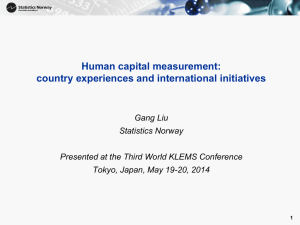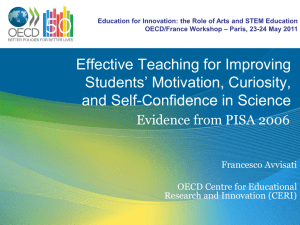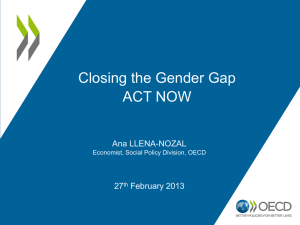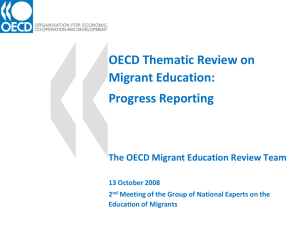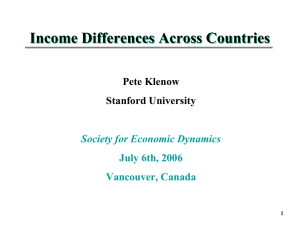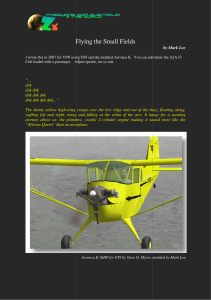Science Education for Innovation-Driven Societies
advertisement
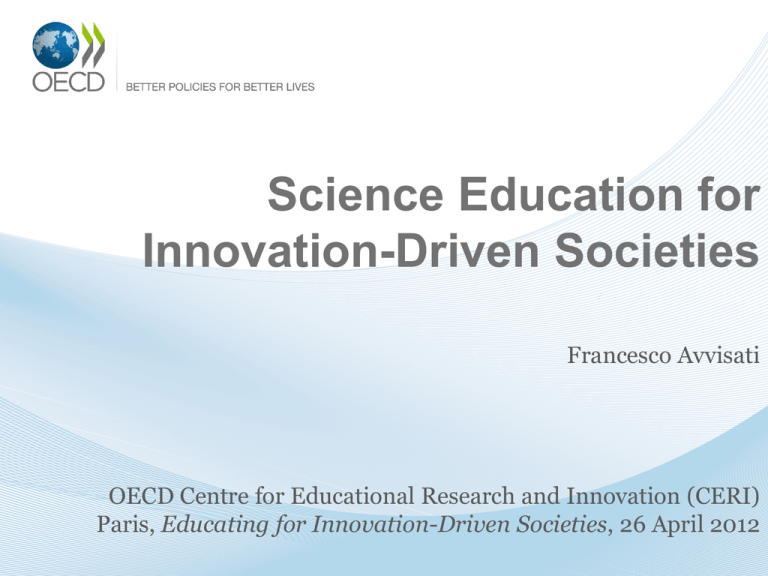
Science Education for Innovation-Driven Societies Francesco Avvisati OECD Centre for Educational Research and Innovation (CERI) Paris, Educating for Innovation-Driven Societies, 26 April 2012 Outline Education and training Skills Innovation • How does science education contribute to individual skills for innovation? • Do education systems foster all skills for innovation? • Are certain science pedagogies more effective in that respect? • How can technology and informal learning help? HOW DOES SCIENCE EDUCATION CONTRIBUTE TO INDIVIDUAL SKILLS FOR INNOVATION? Innovation intensity by field of study • Traditional views emphasise role of STEM graduates, innovation intensity: any type but... other humanities law 40 health 50 knowledge or methods business 60 social sciences 70 education 80 arts technology or tools agriculture 90 architecture product or service engineering & computing sciences & maths 100 30 20 10 0 4 Non-disciplinary skills and innovation • Critical skills according to tertiary educated workers 1 come up with new ideas/solutions willingness to question ideas present ideas to audience alertness to opportunities coordinate activities analytical thinking acquire new knowledge mobilize capacities of others make your meaning clear master of your own field write reports or documents work productively with others write/speak a foreign language use time efficiently use computers and internet perform under pressure negociate knowledge of other fields assert your authority 2 4 3.1 2.9 2.8 2.6 4.1 Odds ratio (innovative vs non-innovative graduates); based on Reflex and Hegesco 5 Science education and Innovation Skills • need to consider learning outcomes that go beyond mastery of content knowledge and of procedural knowledge: – Skills in thinking and creativity, positive habits of mind (curiosity, perseverance,...) and social skills; • Science, as a subject, offers excellent opportunities for developing these... • ... but how far are they really fostered in today’s schools? DO EDUCATION SYSTEMS FOSTER ALL SKILLS FOR INNOVATION? Do countries foster simultaneously subject-based and behavioural skills? Not necessarily Example: Science scores and interest in science Interest in Science Topics 640 620 HIGH SCORE HIGH INTEREST LOW SCORE HIGH INTEREST MEX IDN 600 BRA CHL 580 PRT 560 540 TUR 520 500 480 460 440 LOW SCORE LOW INTEREST 380 400 420 440 GRC ESP RUS HKG ITA MAC FRA SVK DEU HUN ISR LUX AUT SVN JPN POL BEL CHE EST CZE KOR USA IRL CAN NOR GBRAUS ISL NZL DNK FIN SWE NLD 460 Source: OECD, based on PISA 2006 480 500 520 540 560 HIGH SCORE LOW INTEREST 580 600 Science Score 620 Robustness partial correlation coefficents between science interest and science score (1) partial correlation (2) (3) (4) (5) (6) -0.74 -0.71 -0.66 -0.69 -0.74 -0.56 controls: GDP p/c X Luxembourg X X X X Self-concept (mean) X X Self-efficacy (mean) Culture (Hofstede 4dim) X X N X 34 34 33 34 X 32 31 0 -0.5 -1 0.5 Source: OECD, based on PISA 2006 HKG IDN MAC BRA RUS 0.3 IDN MAC HKG MEX HUN PRT USA EST TUR SVK CZE ITA ESP ISR GRC LUX AUT DEU BEL NZL NLD GBR IRL CHE FRA AUS CAN KOR SVN DNK JPN SWE FIN NOR ISL 0.6 BRA RUS 1 GBR SVN GRC CAN DEU FIN IRL AUS CHE LUX FRA DNK SWE NOR ISL JPN KOR -0.3 CHL POL 1E-15 CHL USA PRT ISR ITA POL BEL NZL MEX TUR NLD SVK ESP CZE HUN AUT EST The Test-Score/Interest Paradox within-school correlation of individual interest and scores -0.6 between-school correlation of average interest and scores ARE SOME PEDAGOGIES MORE EFFECTIVE IN FOSTERING ALL SETS OF SKILLS FOR INNOVATION? A within-country analysis Teaching indicators in PISA 2006 based on 4 clusters of activities: • Interaction – Collaboration and participatory exchanges • Application – Drawing connections between school science and the outside world • Hands-on – Guided activities around lab experiments • Investigation – Autonomous student inquiries Pedagogies for innovation skills Science score Interest in Science Topics 0.3 0.3 0.25 0.25 0.2 0.2 0.15 0.15 0.1 0.1 0.05 4 0 -1 8 -2 -0.15 3 0.05 1 0 -2 -0.05 -0.1 20 -0.05 -10 -0.1 -0.15 -2 -1 6 -1 Effective Science Pedagogies • The current teacher has more impact on interest than on scores; • Structured inquiry (“hands-on”) dominates unstructured inquiry for scores • Interest and curiosity are nurtured with “applications”: i.e. when the teacher… – …explains how a school science idea can be applied to a number of different phenomena – …uses science to help students understand the world outside school – …explains the relevance of science concepts to our lives – … uses technological applications to show how school science is relevant to society Leverage technology, harness informal learning opportunities,... INNOVATING SCIENCE EDUCATION Francesco.Avvisati@oecd.org THANK YOU www.oecd.org/edu/innovation
